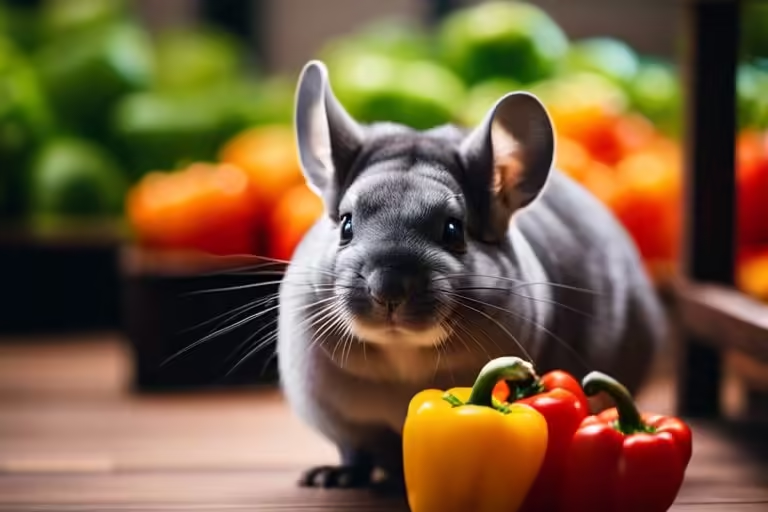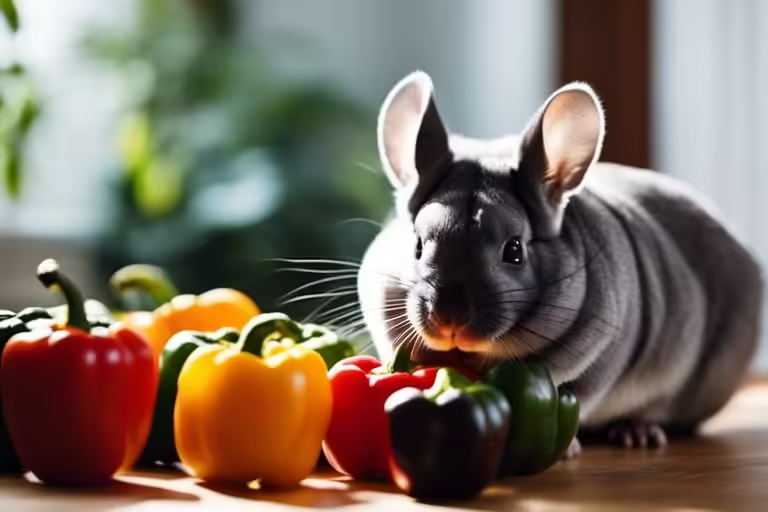It’s important to know what foods are safe and beneficial for your chinchilla, and peppers might be on your mind. While chinchillas can nibble on certain fruits and vegetables, peppers can be harmful to these small rodents. In this informative guide, we’ll explore whether chinchillas can eat peppers, why it’s best to avoid feeding peppers to your furry friend, and provide you with alternative healthy snack options to keep your chinchilla happy and thriving.
Key Takeaways:
- Chinchillas should not eat peppers: Peppers are high in water content and can cause digestive issues in chinchillas.
- Spicy peppers are harmful: Spicy peppers can be especially harmful to chinchillas as they cannot tolerate spicy foods well.
- Stick to chinchilla-safe foods: It is best to stick to a diet of chinchilla pellets, hay, and occasional treats like fruits or vegetables safe for chinchillas.
The Nutritional Needs of Chinchillas
Dietary Requirements
Before delving into whether chinchillas can eat peppers, you must understand their dietary requirements. Chinchillas are herbivores, needing a diet high in fiber and low in fat to maintain their health.
Importance of Fiber and Protein
Needs for your chinchilla, a diet rich in fiber is crucial for proper digestion and preventing gastrointestinal issues. Protein is also vital for maintaining muscle mass and overall health.
For your chinchilla’s diet, hay should make up the majority of their food intake, providing the necessary fiber for digestion. Plus, a small amount of chinchilla pellets and occasional treats like dried fruits or herbs can supplement their diet with vital nutrients.
The Pepper Family
Types of Peppers
Any chinchilla owner should be aware of the different types of peppers that exist. Bell peppers, jalapeños, cayenne peppers, habaneros, and banana peppers are some common varieties. Recognizing the type of pepper is crucial when deciding if it’s safe for your pet.
| Bell peppers | Mild and safe for chinchillas |
| Jalapeños | Spicy and harmful to chinchillas |
| Cayenne peppers | Extremely hot and toxic to chinchillas |
| Habaneros | Extremely spicy and dangerous for chinchillas |
| Banana peppers | Moderately spicy and not recommended for chinchillas |
Nutritional Profile of Peppers
With a variety of colors and flavors, peppers not only add taste to your dishes but also offer vital vitamins and antioxidants. They are low in calories and high in vitamin C, beneficial for your chinchilla’s health.
Family
Peppers belong to the nightshade family, containing a compound called capsaicin which can be harmful to chinchillas. While some peppers are safe in moderation, it’s crucial to avoid spicy varieties that can upset your pet’s delicate digestive system.
Can Chinchillas Eat Peppers?
The Potential Benefits
Now, chinchillas can eat peppers in moderation. Peppers are rich in Vitamin C, which is necessary for your chinchilla’s overall health. It can help boost their immune system and promote skin and coat health.
The Potential Risks
Potential risks of feeding peppers to your chinchilla include digestive issues. Peppers are acidic and can upset your chinchilla’s delicate digestive system. It’s important to introduce peppers gradually into their diet to monitor any adverse reactions.
Understanding the potential risks is crucial when feeding peppers to your chinchilla. Peppers may cause stomach upset and diarrhea in some chinchillas. Monitor your chinchilla closely after introducing peppers into their diet and consult a veterinarian if you notice any concerning symptoms.

Preparing Peppers for Chinchillas
Safe Preparation Methods
Despite being a tasty treat for your chinchilla, peppers need to be prepared properly to ensure they are safe to eat. An important method is to wash the peppers thoroughly to remove any pesticides or contaminants that could harm your pet.
Avoiding Toxic Compounds
Methods like removing the seeds and membrane of the pepper before feeding it to your chinchilla can help avoid potential toxins. It’s important to note that these parts of the pepper may contain compounds that could be harmful to your furry friend, so it is best to remove them before serving.
Peppers belong to the nightshade family, which can contain substances like solanine that are toxic to chinchillas. By removing these parts of the pepper, you can reduce the risk of your pet ingesting harmful compounds and keep them safe and happy.
Introducing Peppers into a Chinchilla’s Diet
Gradual Introduction
Keep in mind that your chinchilla’s digestive system is delicate, so when introducing peppers into their diet, do so gradually. Start by offering a small piece and observe how your furry friend reacts over the next 24 hours.
Monitoring for Adverse Reactions
Any sudden changes in your chinchilla’s behavior or digestive patterns after eating peppers should be closely monitored. Look out for signs of bloating, diarrhea, or decreased appetite.
For instance, if you notice any of these symptoms, immediately remove peppers from your chinchilla’s diet and consult with a veterinarian. It’s vital to prioritize your pet’s well-being and adjust their diet accordingly to ensure they remain healthy and happy.
Alternatives to Peppers for Chinchillas
Other Fresh Vegetables
Many fresh vegetables can be great alternatives to peppers for your chinchilla. Leafy greens like spinach, kale, and romaine lettuce are excellent choices. Carrots, celery, and cucumber are also safe options that provide important nutrients for your pet.
Hay and Pellet Options
Fresh hay and high-quality pellets are crucial components of a chinchilla’s diet. Make sure to provide timothy hay or other grass hays, along with pellets specifically formulated for chinchillas to ensure they get the necessary vitamins and minerals.
Chinchillas thrive on a diet rich in hay to aid digestion and wear down their constantly growing teeth. Pellets should be fed in moderation to complement the hay and vegetable portion of their diet.
Peppers can be a tasty treat for your chinchilla, but be cautious with spicy varieties like jalapeños that can cause digestive issues. Bell peppers are a safer option, providing vitamin C and a crunchy texture that chinchillas enjoy in moderation.
Summing up
Taking this into account, it is evident that chinchillas can eat peppers in moderation as a treat due to their high water content and natural sweetness. However, it’s crucial to remove seeds and opt for bell peppers over spicier varieties. Always consult with a veterinarian before introducing new foods into your pet’s diet to ensure their health and well-being is maintained.
FAQ
Q: Can chinchillas eat bell peppers?
A: Yes, chinchillas can eat small quantities of bell peppers as an occasional treat. However, it is important to remove the seeds and wash the pepper thoroughly to remove any pesticides or chemicals before offering it to your chinchilla.
Q: Can chinchillas eat spicy peppers?
A: No, chinchillas should not eat spicy peppers such as jalapeños, habaneros, or any other hot peppers. These peppers can cause digestive issues and stomach upset in chinchillas due to their sensitive digestive systems.
Q: Are there any benefits to feeding chinchillas peppers?
A: Bell peppers are high in vitamin C and other nutrients that can benefit a chinchilla’s health in small amounts. However, it is crucial to remember that chinchillas have specific dietary requirements, and peppers should only be given as an occasional treat alongside their regular hay and pellets.
